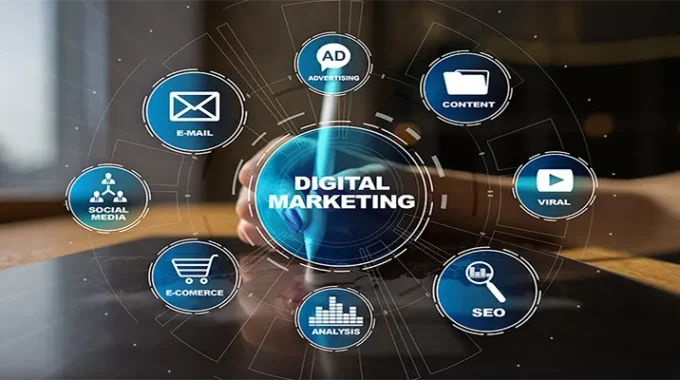Digital marketing is no longer just an optional investment for businesses—it’s a vital strategy that determines brand visibility, lead generation, and customer engagement. As the digital landscape evolves rapidly, it’s essential for businesses and marketers to adapt to the latest trends that shape how audiences interact, consume, and respond to digital content.
To remain competitive and agile, many professionals are enrolling in Digital Marketing Courses in Pune to keep up with the ongoing changes in the industry and to build future-ready skill sets. Whether you’re a business owner or a budding marketer, understanding what’s ahead in 2025 can give you a winning edge.
1. Hyper-Personalization: The Future of Customer Experience
Personalization has gone beyond just adding a customer’s name in an email. In 2025, hyper-personalization will become the gold standard. Brands will rely heavily on AI and machine learning to analyze user behavior, preferences, past purchases, and even emotions to deliver relevant content and offers.
Personalized marketing campaigns will be based on real-time data, ensuring customers receive offers they actually care about—on the platforms they use most. Businesses that fail to personalize user experience risk being ignored in a crowded digital space.
2. AI and Automation Will Lead the Way
Artificial Intelligence (AI) is revolutionizing every aspect of digital marketing. In 2025, AI-powered tools will dominate content creation, customer service (via chatbots), email campaigns, and advertising. Businesses will increasingly rely on AI for automating repetitive tasks and providing deep insights into consumer behavior.
Tools like ChatGPT, Jasper, and Google’s AI ad algorithms already play an important role, but their capabilities will become even more advanced—offering predictive analytics and personalization that marketers once only dreamed of.
3. Voice Search Will Shape SEO Strategies
With voice assistants like Alexa, Siri, and Google Assistant becoming part of daily life, voice search is on the rise. In 2025, SEO strategies will be heavily influenced by how people talk, not just how they type.
Voice search queries tend to be more conversational and question-based. Optimizing content with long-tail keywords, FAQs, and local SEO will help businesses stay relevant in this new search environment. Marketers must also focus on natural language processing (NLP) to improve visibility in voice search results.
4. Short-Form Video Will Dominate Content Strategy
Platforms like TikTok, Instagram Reels, and YouTube Shorts have transformed how users consume content. Short-form videos are engaging, mobile-friendly, and perfect for delivering quick, valuable insights. In 2025, they will be essential in every brand’s content marketing strategy.
Whether it’s educational content, product demos, testimonials, or trends, short-form videos will be the most effective format to engage and retain users. Video SEO will also rise in importance, requiring optimized titles, tags, and transcripts to improve rankings.
5. The End of Third-Party Cookies: A New Era of Data
With Google planning to fully phase out third-party cookies, 2025 marks a new era in privacy and data handling. Marketers will shift focus to first-party and zero-party data—data that customers willingly share via signups, surveys, or interactions.
Building trust through transparent data collection practices will be critical. Businesses must also invest in platforms that support customer data management and consent preferences, enabling personalized experiences without compromising privacy.
6. Social Commerce: Blending Content and Commerce
The integration of shopping features into social media platforms has given rise to social commerce. In 2025, users will not just discover brands on Instagram, TikTok, and Facebook—they will complete the entire purchase journey within the app.
Live-stream shopping, shoppable posts, and influencer-led sales campaigns will become mainstream. Brands that make purchasing frictionless through native app checkouts will see increased sales and higher engagement.
7. Influencer Marketing Will Get More Authentic
Influencer marketing is maturing. Brands are now focusing on nano (1K–10K followers) and micro-influencers (10K–100K followers) who have strong, engaged communities and niche appeal.
Instead of one-time paid promotions, businesses will forge long-term relationships with influencers who genuinely align with their brand values. Authenticity, relatability, and content quality will matter more than reach alone. Expect influencer-driven user-generated content (UGC) to play a major role in marketing campaigns.
8. Visual Search and Image Recognition Will Transform Discovery
Visual search is gaining traction as users increasingly rely on images rather than text to search for products and information. Tools like Google Lens and Pinterest Lens are already being used widely to identify objects, scan barcodes, and discover visually similar content.
In 2025, brands must optimize their images with proper file names, alt-text, structured data, and fast-loading formats to rank in visual search results. This shift will be especially important for industries like fashion, furniture, and retail.
9. Augmented Reality (AR) Will Enhance E-Commerce Experiences
Augmented Reality (AR) has opened up exciting possibilities for online shopping. In 2025, AR will play a key role in helping customers visualize products—whether it’s trying on clothes, testing makeup, or seeing how furniture fits in their living space.
AR-driven ads and experiences will not only improve customer satisfaction but also reduce return rates by helping users make more confident purchase decisions. Brands investing in AR now will see a long-term competitive advantage.
10. Sustainable and Ethical Marketing Will Influence Brand Loyalty
Modern consumers, especially Gen Z, care about a brand’s environmental impact and social values. In 2025, sustainable and ethical marketing will become key factors in building brand loyalty.
From eco-friendly packaging to inclusive advertising and carbon-neutral web design, brands must communicate their values clearly and back them with real action. Cause-driven campaigns and partnerships with NGOs or social organizations will also resonate with conscious consumers.
11. Omnichannel Marketing Will Be the Norm
Today’s consumers move fluidly across devices and platforms—expecting a consistent brand experience at every touchpoint. Omnichannel marketing ensures that your message, branding, and offers are seamlessly integrated across email, website, social media, apps, and even offline channels.
In 2025, businesses will increasingly adopt CRMs and AI-powered tools that map out the customer journey and automate interactions. Whether someone starts browsing on mobile and completes a purchase on desktop, or interacts with a chatbot then visits a store—the experience should be frictionless and personalized.
12. Programmatic Advertising Will Drive Better ROI
Programmatic advertising automates the process of buying and optimizing digital ads. It uses data and AI to target the right audience at the right time, improving efficiency and reducing ad spend wastage.
By 2025, programmatic advertising will not just be used for display ads, but also for video, audio, native, and even out-of-home (OOH) media. Marketers will be able to run hyper-targeted campaigns at scale, improving ROI through automation and real-time bidding.
13. Interactive and Dynamic Email Marketing Will Resurge
Email marketing remains one of the most effective channels, but it’s evolving. In 2025, email campaigns will be more interactive—with embedded polls, dynamic content blocks, countdown timers, and in-email purchases.
Thanks to AI, email marketers can also create predictive campaigns that adapt content based on user actions. Hyper-segmentation will allow for more meaningful communication that leads to higher open and click-through rates.
14. Conversational Marketing Will Become More Human-Like
Conversational marketing via chatbots, messaging apps, and live chat is already in use—but 2025 will bring a new level of sophistication. Thanks to AI and NLP (Natural Language Processing), chatbots will feel more natural, context-aware, and responsive.
Customers prefer quick, personalized responses, and businesses that invest in conversational experiences will benefit from higher engagement, faster conversions, and better support outcomes.
15. Digital Marketing Education Will Be a Game Changer
The rapid evolution of digital tools and strategies means continuous learning is essential. Many aspirants and working professionals are now turning to structured courses to stay updated and employable in this competitive landscape.
Programs offering Digital Marketing Courses in Pune with Placement are seeing growing interest, especially among those who want real-world exposure, internships, and guaranteed job assistance. In 2025, such courses will be the stepping stone for building high-demand skills like SEO, paid media, content marketing, and analytics—setting up professionals for long-term career success.
Conclusion
The digital marketing landscape in 2025 will be shaped by intelligent automation, immersive content, privacy-conscious strategies, and personalized experiences. Marketers who stay ahead of these trends will be better equipped to reach and retain their audiences in a rapidly evolving digital world.
From AI-powered tools and AR experiences to ethical branding and advanced data strategies—each trend offers a new way to connect, convert, and grow. Embracing these innovations today will pave the way for sustained success tomorrow.











